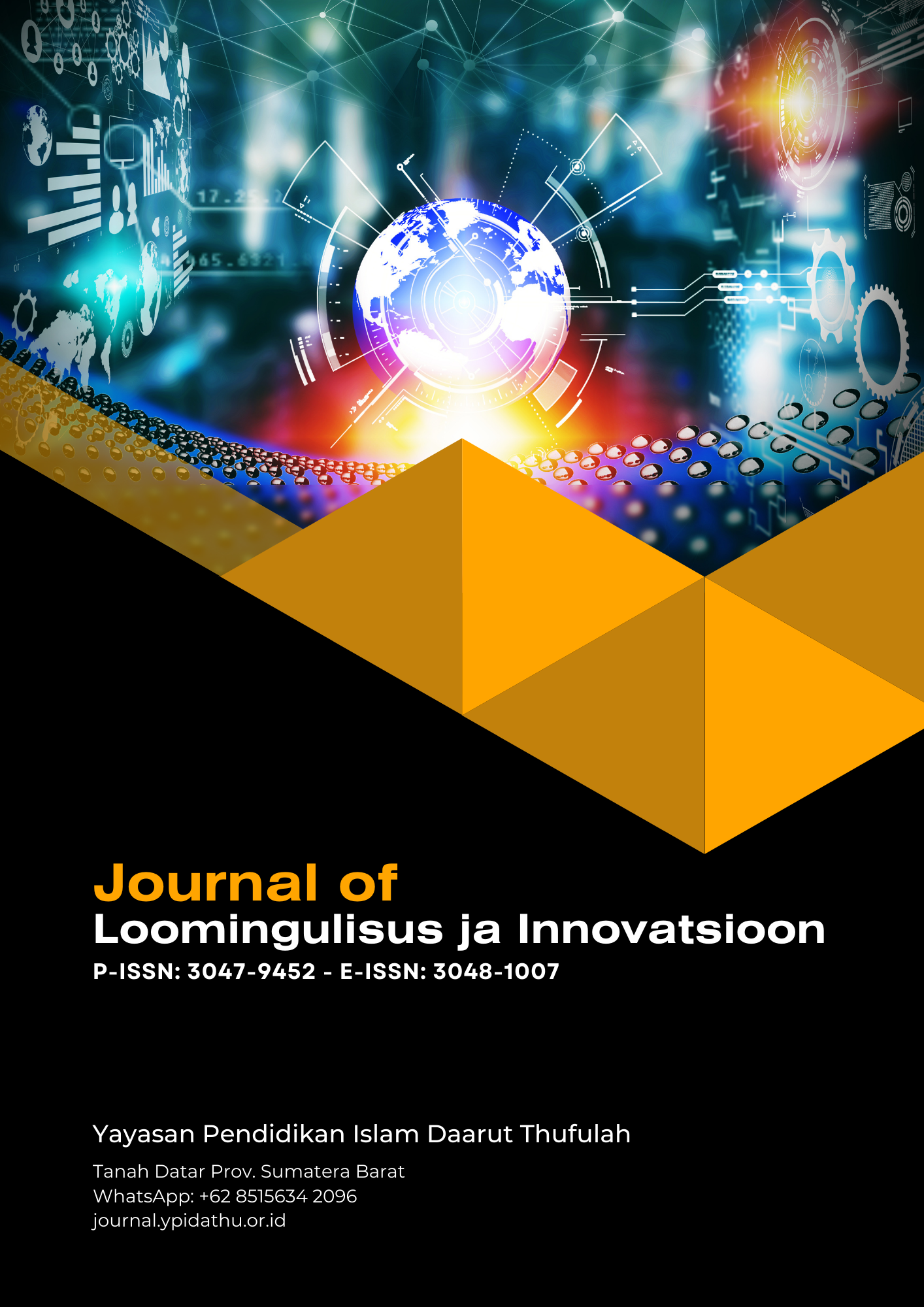Collaborative Creativity in Remote Work Teams: A Network Analysis of Digital Brainstorming Sessions
Abstract
The shift to remote work has transformed the way teams engage in creative processes, making digital collaboration tools central to brainstorming and innovation. This study aims to investigate the dynamics of collaborative creativity in remote work settings by analyzing patterns of interaction during digital brainstorming sessions. A mixed-methods network analysis approach was employed, combining social network analysis with qualitative content analysis to map communication structures and creative idea flow across 18 virtual teams composed of 162 participants from diverse professional backgrounds. Data were collected from 54 recorded online brainstorming sessions conducted over a period of three months. Results indicate that teams with more decentralized interaction networks and balanced participation demonstrated higher levels of creative idea generation and convergence. Findings further reveal that the quality of creative outputs is influenced not only by individual contributions but also by the connectivity and diversity of collaborative ties within the team. The study concludes that fostering inclusive and distributed patterns of interaction is key to enhancing creativity in virtual environments.
Full text article
References
Bai, G., Xu, P., & Meng, D. (2025). Are CEO successors more likely to implement environmentally responsible behavior? Empirical evidence from listed companies in China. Humanities and Social Sciences Communications, 12(1). Scopus. https://doi.org/10.1057/s41599-025-04687-1
Chan, T. J., Huam, H. T., Wong, S. Y., Samson, J., & Fadzilah, A. H. H. (2025). The impact of corporate social responsibility practices on customer purchase intention of clothing industry: An integration of triple bottom line and ISO26000. Decision Science Letters, 14(1), 79–90. Scopus. https://doi.org/10.5267/j.dsl.2024.11.001
Chava, S., Kim, J. H. J., & Lee, J. (2025). Risk, return, and environmental and social ratings. Journal of Corporate Finance, 92. Scopus. https://doi.org/10.1016/j.jcorpfin.2025.102744
Chen, M., Tan, X., Zhu, J., & Dong, R. K. (2025). Can supply chain digital innovation policy improve the sustainable development performance of manufacturing companies? Humanities and Social Sciences Communications, 12(1). Scopus. https://doi.org/10.1057/s41599-025-04601-9
De Bernardi, C., & Annesi, N. (2025). On the role of water utility governance for climate resilience: A Corporate Social Responsibility Directive approach. Utilities Policy, 95. Scopus. https://doi.org/10.1016/j.jup.2025.101931
Fontoura, L., Luiz de Mattos Nascimento, D., Neto, J. V., & Gusmão Caiado, R. G. (2025). Energy Gen-AI technology framework: A perspective of energy efficiency and business ethics in operation management. Technology in Society, 81. Scopus. https://doi.org/10.1016/j.techsoc.2025.102847
He, M., Zhang, W., Du, X., Zhang, Y., Cui, X., Huang, J., Chen, X., & Gao, H. (2025). A study on accelerate the hydrogen energy industry adjustment and regain investment confidence—Based on Econ-ESG insight. Renewable Energy, 245. Scopus. https://doi.org/10.1016/j.renene.2025.122768
Khalilzadeh, J., Kromidha, E., & Taheri, B. (2025). Anatomy of a CSR discourse system: Entrepreneurship and tourism domains. Tourism Management, 110. Scopus. https://doi.org/10.1016/j.tourman.2025.105195
Li, S., Chen, Z., Diao, Y., & Chen, Z. (2025). The impact of green finance on debt financing costs from the perspective of strategic corporate signaling behavior—Evidence from China. International Review of Financial Analysis, 102. Scopus. https://doi.org/10.1016/j.irfa.2025.104024
Mavruk, T. (2025). Local CSR, local ownership and firm value. International Review of Financial Analysis, 102. Scopus. https://doi.org/10.1016/j.irfa.2025.104091
Mohd Radzi, N. A., Saidi, N. A., Hassan, S., Ibrahim, M. S. N., & Lee, K. E. (2025). Exploring corporate social responsibility practices in the telecommunications, broadcasting and courier sectors: A comparative industry analysis. Humanities and Social Sciences Communications, 12(1). Scopus. https://doi.org/10.1057/s41599-025-04668-4
Narong, D. K. (2025). Business and management education for sustainability: A state-of-the-art review of literature post-UN Decade of Education for Sustainable Development (2015–2023). International Journal of Management Education, 23(2). Scopus. https://doi.org/10.1016/j.ijme.2024.101115
Okuyama, A., Tsugawa, S., Matsunaga, C., & Managi, S. (2025). Companies adjust tax payments to offset changes in publicly perceived impact on environment, social, and governance factors. Humanities and Social Sciences Communications, 12(1). Scopus. https://doi.org/10.1057/s41599-024-04199-4
Roy, J. K., & Vasa, L. (2025). Financial technology and environmental, social and governance in sustainable finance: A bibliometric and thematic content analysis. Discover Sustainability, 6(1). Scopus. https://doi.org/10.1007/s43621-025-00934-2
Sabir, G., Tennhardt, L. M., & Home, R. (2025). Heaven and earth: A systematic review of theories on the relationship between religion and environmental behaviour. Discover Sustainability, 6(1). Scopus. https://doi.org/10.1007/s43621-025-01005-2
Schmitz, G. M. (2025). An Unsupervised Machine Learning Analysis of Environmental Sustainability Indicators Using the K-Means Clustering Algorithm Among 2,485 Global Corporations. International Journal of Sustainability Policy and Practice, 21(1), 77–100. Scopus. https://doi.org/10.18848/2325-1166/CGP/v21i01/77-100
Suta, A., Molnár, P., Limbach, Z., & Tóth, Á. (2025). Dictionary-based assessment of European Sustainability Reporting Standard (ESRS) disclosure topics. Discover Sustainability, 6(1). Scopus. https://doi.org/10.1007/s43621-025-00930-6
Tang, L., Zhao, H., Zhou, Z., Qian, Z., Hou, S., & Liu, B. (2025). Can government procurement drive corporate green technology innovation? Evidence from Chinese listed companies. Evaluation and Program Planning, 111. Scopus. https://doi.org/10.1016/j.evalprogplan.2025.102592
Tian, L., Song, X., Du, M., & Xu, B. (2025). The disciplinary impact of capital market internationalization on corporate ESG greenwashing: A study of A-shares’ inclusion in the MSCI index. International Review of Financial Analysis, 103. Scopus. https://doi.org/10.1016/j.irfa.2025.104202
Troy, C. L. C., Eng, N., & Overton, H. (2025). Corporate support for the sustainable development goals: Effects of symbolic and substantive communication. Public Relations Review, 51(2). Scopus. https://doi.org/10.1016/j.pubrev.2025.102545
Xu, J., Duan, H., & Deng, S. (2025). Managing social responsibility efforts with the consideration of violation probability. European Journal of Operational Research, 323(3), 852–867. Scopus. https://doi.org/10.1016/j.ejor.2025.01.016
Yang, Q., & Xiang, R. (2025). Structure of interest-bearing liabilities and corporate ESG performance. International Review of Financial Analysis, 102. Scopus. https://doi.org/10.1016/j.irfa.2025.104117
Zeng, J., Ávila-Romero, F., Ren, J., & Ribeiro-Navarrete, S. (2025). Shaping effect of digitalisation on corporate social responsibility: Evidence from Born Global Entrepreneurial firms. International Entrepreneurship and Management Journal, 21(1). Scopus. https://doi.org/10.1007/s11365-025-01066-9
Zhang, Y., Jin, X., & Li, H. (2025). The impact of digital financial inclusion on the high-quality development of small- and medium-sized enterprises—Evidence from China. International Review of Financial Analysis, 102. Scopus. https://doi.org/10.1016/j.irfa.2025.104074





